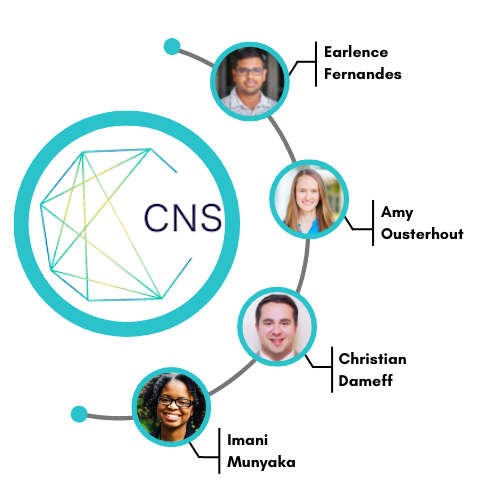CNS’S NETWORK GROWS STRONGER
UC San Diego’s Center for Networked Systems (CNS) is adding four additional faculty members to its growing ranks. Department of Computer Science and Engineering (CSE) assistant professors Earlence Fernandes, Imani Munyaka and Amy Ousterhout will be supporting CNS research endeavors, along with Christian Dameff, MD, an assistant professor with the university’s Department of Emergency Medicine. 
While Ousterhout’s research focuses on operating systems and networks in datacenters, Dameff, Fernandes and Munyaka are studying cybersecurity concerns. Their affiliation with CNS expands the group to nearly 30 university faculty members – each one engaged in cutting-edge research.
“The mission of CNS is to connect the world-leading research of our faculty with our industrial partners who are facing real-world problems in these areas. With the addition of Amy, Christian, Earlence and Imani we are growing the depth and breadth of our research portfolio to include system resource scheduling and critical security problems in health care, Internet of Things (IoT), machine learning and usability,” said CNS co-director Stefan Savage who is also a CSE professor.
CNS is a research center that utilizes new techniques, evaluations, methodologies, and technologies to address emerging problems in modern computing and data processing infrastructure before they become critical.
“As CNS continues to grow, we are excited about the new opportunities this growth brings,” said CNS co-director and CSE professor George Porter.
Improving Medical Care and Safety
Dr. Christian Dameff aims to improve patient care and safety by exploring the risks inherent in integrating technology into the healthcare system. Dameff, with UC San Diego’s Department of Emergency Medicine, has researched hacking 911 systems, HL7 messaging vulnerabilities and malware.
“I work at the intersection of cybersecurity and patient safety, where bits and bytes meet flesh and blood,” said Dameff. “As cyber threats continue to plague healthcare, measuring the effects of events like ransomware on the diagnosis and treatment of disease is increasingly important and the start to effective prevention and response.”
As an emergency physician, clinical informaticist and co-founder of CyberMed Summit, Dameff hopes his efforts will help leadership in both private and government sectors to improve disaster preparedness and response systems.
“CNS will play a very important role in my research by facilitating interactions and key collaborations with world-renowned experts in the fields of networking and security,” he noted.
Establishing a Safer Computerized World
Earlence Fernandes is tackling one of computer science’s most pressing challenges: how to make the computerized world safe for everyone. Emerging technologies, such as smart phones and IoT devices, have made access to information easier but also less secure.
“My goal is to anticipate the security issues of emerging technologies and establish their security foundations so that society can gain the benefits of tech without the security problems,” said Fernandes. “Ultimately, building secure systems will make sensitive resources less vulnerable to attackers.”
Fernandes earned his bachelor’s in engineering from the University of Pune in Pune, India and his PhD in computer security from the University of Michigan. He is a recipient of the 2022 National Science Foundation CAREER Award and a 2022 Amazon Research Award.
Making Security and Privacy More Accessible
Imani Munyaka has made it her goal to alleviate cybersecurity concerns for marginalized, minoritized and historically ignored populations. Her research, which includes several studies with the blind, investigates the intersection of usability, security and privacy with a focus on improving the user’s experience with mobile device apps.
“My research is heavily focused on the human experience,” says Munyaka. “Most of the time, I’m focused on the security and privacy decision-making process of end-users and what we can do to improve the outcomes of the process.”
When assessing an app, Munyaka looks at usability and accessibility. She defines usability as a measure of how easy it is to use, and comprehend or interpret, a system or tool the way it was intended. Accessibility considers cost and availability as well as inclusivity for individuals with disabilities. Looking at colors, icons, phrases, noises and vibrations, Munyaka tests security warning variations to determine whether changes can be made to enhance the user’s experience. She contends that user experience is essential when determining the most effective cybersecurity solution.
Munyaka’s research has applications in spam warnings, voting technology, branchless banking and misinformation. She joined the CSE department in 2021 after completing her doctorate in Human Centered Computing at the University of Florida.
Combating Climate Change with Computer Science
Amy Ousterhout joined CSE’s systems and networking (Sysnet) group at the start of this school year. Her primary research interest is in operating systems and networks in datacenters with a focus on improving efficiency of applications – all while maintaining fast response times and supporting high request rates.
“My goal is to enable datacenter applications to achieve the same high performance while using fewer CPUs [central processing units], less memory or less energy,” said Ousterhout. “My hope is that, by making datacenters more efficient, I can contribute to the important goal of combating climate change.”
Ousterhout came to the university by way of UC Berkeley where she was a postdoctoral researcher in the NetSys Lab. Prior to that, she earned her PhD from the Massachusetts Institute of Technology and her bachelor’s in Computer Science from Princeton University.
